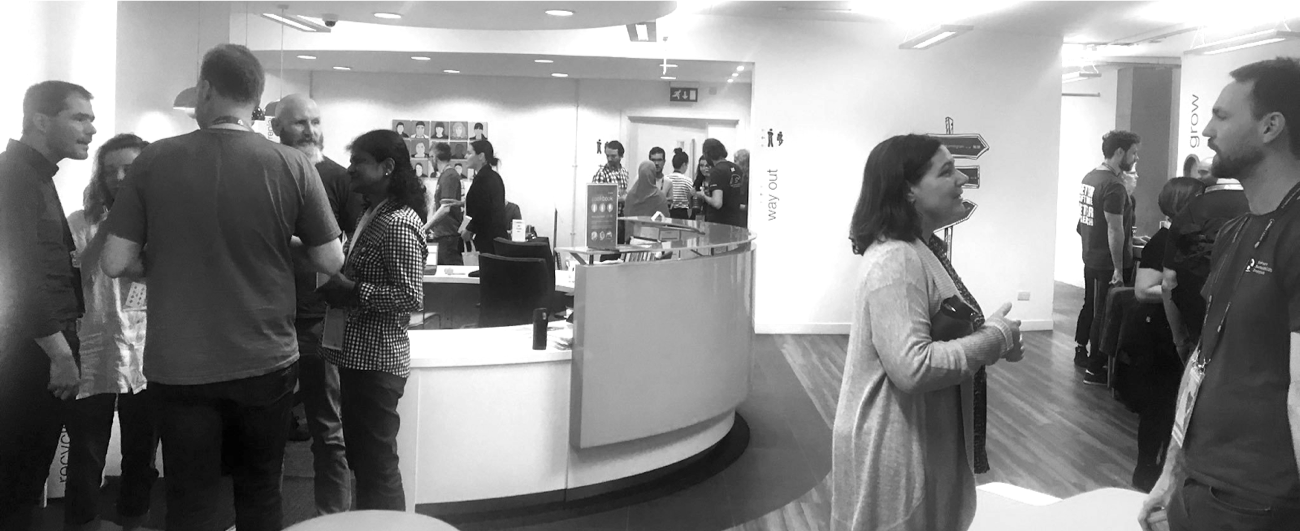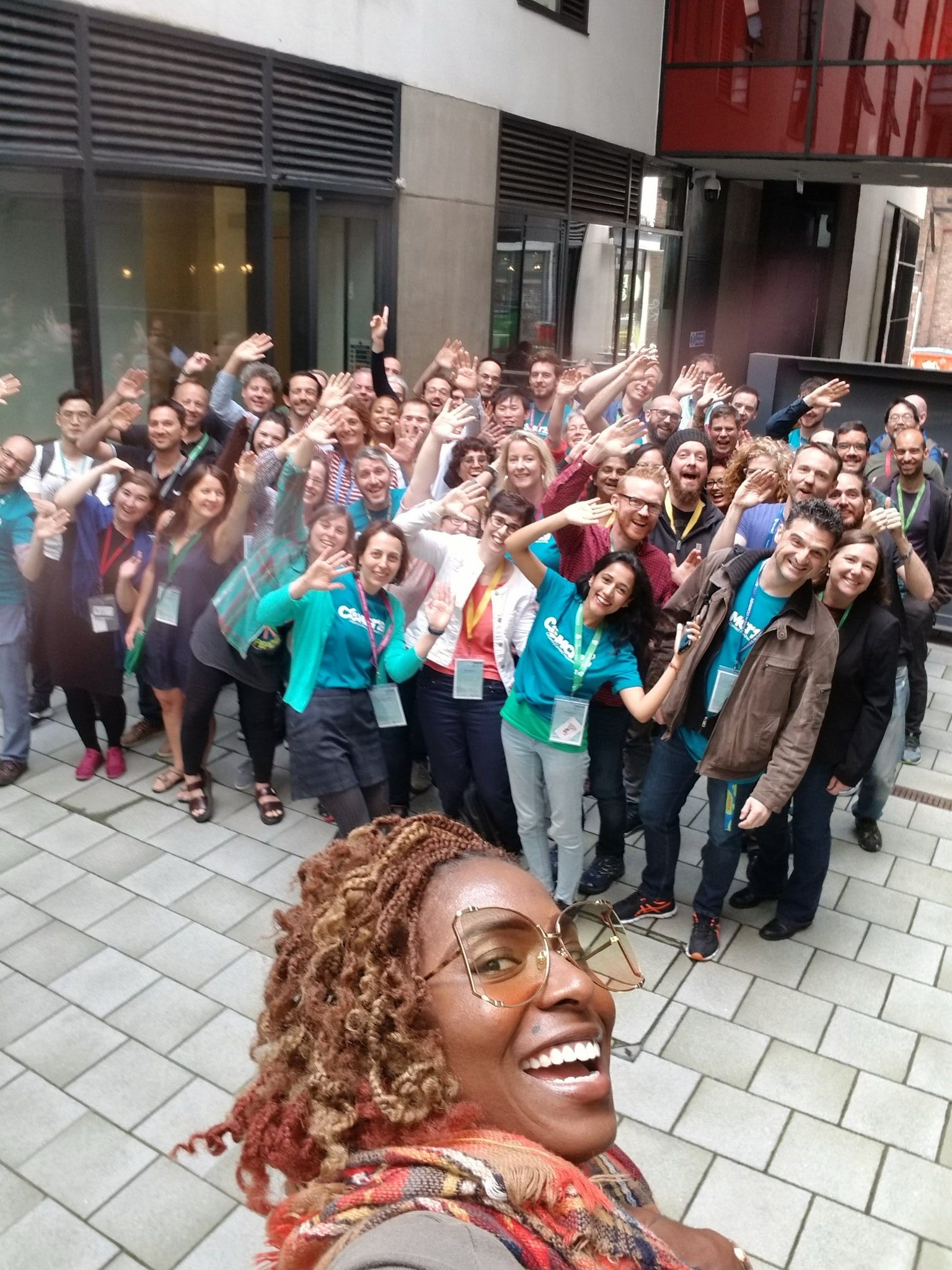Connecting with the Community at CarpentryConnect in Manchester
One of the highlights this year for The Carpentries’ community in Europe was the CarpentryConnect event, which took place from 24 to 27 June 2019 in the vibrant British city of Manchester. Aleks Nenadic, the Training Lead at the Software Sustainability Institute, chaired the organisation team and recently posted a report from this incredible meeting. Here are some of my personal highlights and notes.
Many people I have known over the years while working in the different Open Science spaces were going to be there. This was enough reason for me to not miss this event. Moreover, under the leadership of Aleks, I got to be part of the organisation team and contribute in small ways to this very thoughtful and welcoming meeting. As promised in the program, keynote lectures, hands-on sessions, workshops, and social events provided us with a number of opportunities to exchange both the technical and transferable skills with each other and ensure that we left the meeting with our hearts full of joy and minds full of ideas.
Highlights
The meeting started with Aleks setting a stage for what to expect and how to participate in creating an inclusive and sustainable event. Tracy Teal, the Executive Director of The Carpentries, began her talk on democratising data and data literacy by inviting us to think about how we can empower culturally and linguistically diverse students. She reminded us that this community advocates the active learning/teaching method of ‘I-We-You’: I introduce a topic – We do it together – You do it by yourself with the help of others. She noted that we are still developing our guidelines and Code of Conduct to best support our members while finding a balance between transparency and confidentiality. With a positive attitude towards the ‘growth mindset’, we as a community still have a lot to learn. Tania Allard and I ran an icebreaker session after the first keynote to facilitate initial interactions among the attendees.
 Carpentries community members chatting during one of the breaks at CarpentryConnect in Manchester
Carpentries community members chatting during one of the breaks at CarpentryConnect in Manchester
Tracy’s talk was perfectly complemented by Lex’s talk ‘Learning from The Carpentries’ on Day 2, where he gave a refresher on the topics from our instructor’s training material in the context of his own experience as one of the earliest contributors in the community. He touched upon several relevant topics such as training, inclusivity, ‘good enough’ practices, and mental health. He reminded us that we need to say ‘no’ to make time to take care of our physical and mental health and tell ourselves more often – we are good enough. His simple and honest talk felt like a personal conversation with a good old friend. He finished by asking us to think of keywords that represent what we’ve learnt from The Carpentries, which was then used for live-generating a word cloud via menti.com.
Mine Cetinkaya-Rundel talked about the effective teaching practices that allow students to ‘see’ from the beginning what they will achieve with the skills we are trying to teach them. Her talk under the unforgettable title ‘Let them eat cake (first!)’ emphasised on the backward designing of training. She broke down her approach into five points: 1) start with showing them ‘the cake’ AKA outcome of the training; for example, data visualisation, 2) Cherish Day 1 by using simpler interfaces and avoiding installation hurdles, 3) Skip baby steps. Sometimes you may want to start with a complex piece of code that you can explain layer by layer, 4) Hide the veggies; that is, don’t teach them complex concept until you have created a need for that, 5) Leverage the ecosystem by explaining the process and how that can be achieved by the coding practices.
Our final keynote speaker, Marta Teperek gave a very humble talk on providing support to the researchers that allowed us to understand data stewardship better based on her team’s impressive work at TU Delft. She presented an analogy of the Data Stewards as general practitioners, who diagnose the pain points and identify approaches to deal with challenges related to a specific dataset that someone is struggling with. She added that “it is ‘unFAIR’ to simply expect researchers to make their research (data) FAIR (Findable, Accessible, Interoperable, Reusable), without providing appropriate support”. She ended her talk by saying that we should accept support, thank people, give a helping hand, and acknowledge every small step people take towards better science.
Personal notes
My travel was supported by ELIXIR Europe and the Software Sustainability Institute Fellowship. I co-led two sessions: on Day 1 with SherAaron Hurt (Sher!) and on Day 2 with Allegra Via and Mateusz Kuzak. During the first session on the topic “Actionable ways to improve inclusiveness in your community”, Sher! and I wanted to take the conversation beyond the fact that diversity is required. We aimed to co-create a list of actions that we can take to improve inclusiveness and grow a healthy community. You can see the complete schedule and format of this session here. The second session took place under the topic “ELIXIR Open Source Software best practices”. Allegra and Mateusz gave some background of the project and introduced the FAIR principle in regards to the software development. In this session, we led a discussion to identify the main aspects of the Software Management Plans (SMP) that can offer recommendations for Open Source software users and developers in the ELIXIR communities. We discussed these aspects in three levels of importance: reusability, functionality, and long term sustainability.
The final day was completely dedicated to the various workshops running in parallel tracks, so, even though I was there, I still felt the FOMO (Fear of Missing Out) just because I couldn’t attend many sessions that I would’ve liked to.
The most important asset of The Carpentries community is its members. This event upheld this value by providing a perfect environment for us to reconnect with community members, most of whom were meeting for the first time in-person, and welcome new members with open arms (literally!). It was like a family reunion and everyone was excited to be there.
My experience will be only partially captured in this post if I don’t mention that I am fortunate to know and work with all the amazing people within this community. I will totally attend this event again – even when there won’t be a surprise magician, an illustrator, and a dog (yes! they were all there).
 Carpentries community members in a group selfie at CarpentryConnect in Manchester
Carpentries community members in a group selfie at CarpentryConnect in Manchester
This post was originally posted on the blog series by Software Sustainability Institute’s Fellow 2019